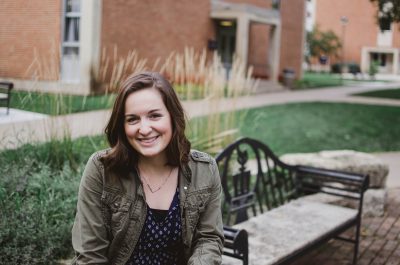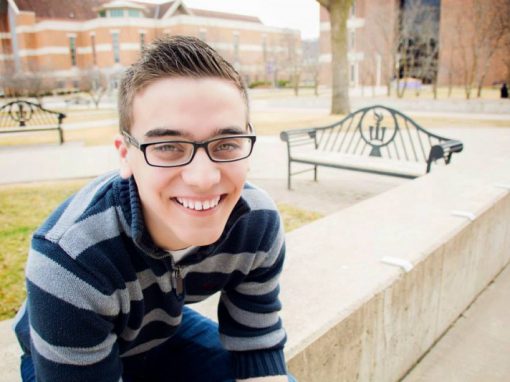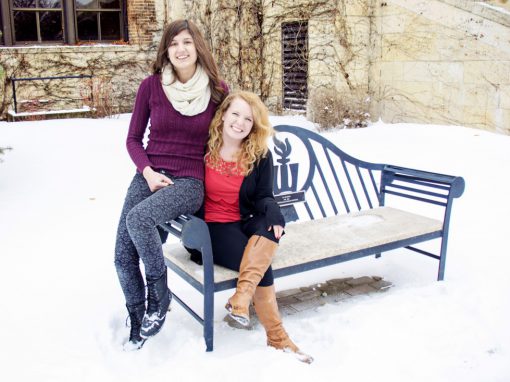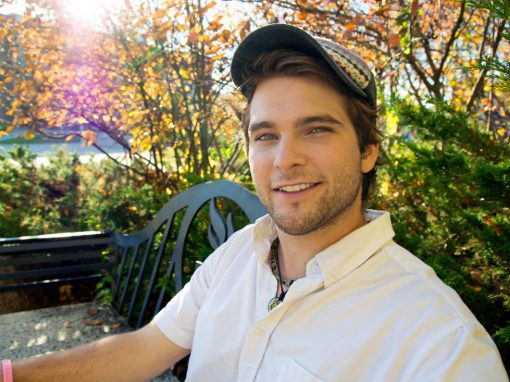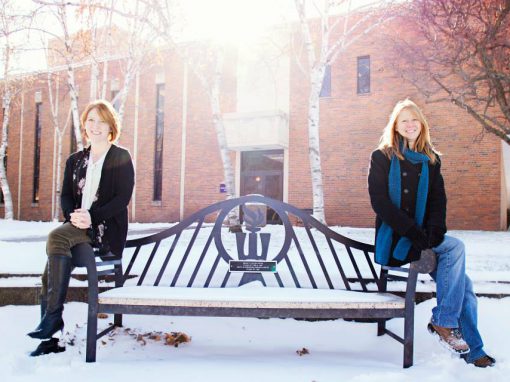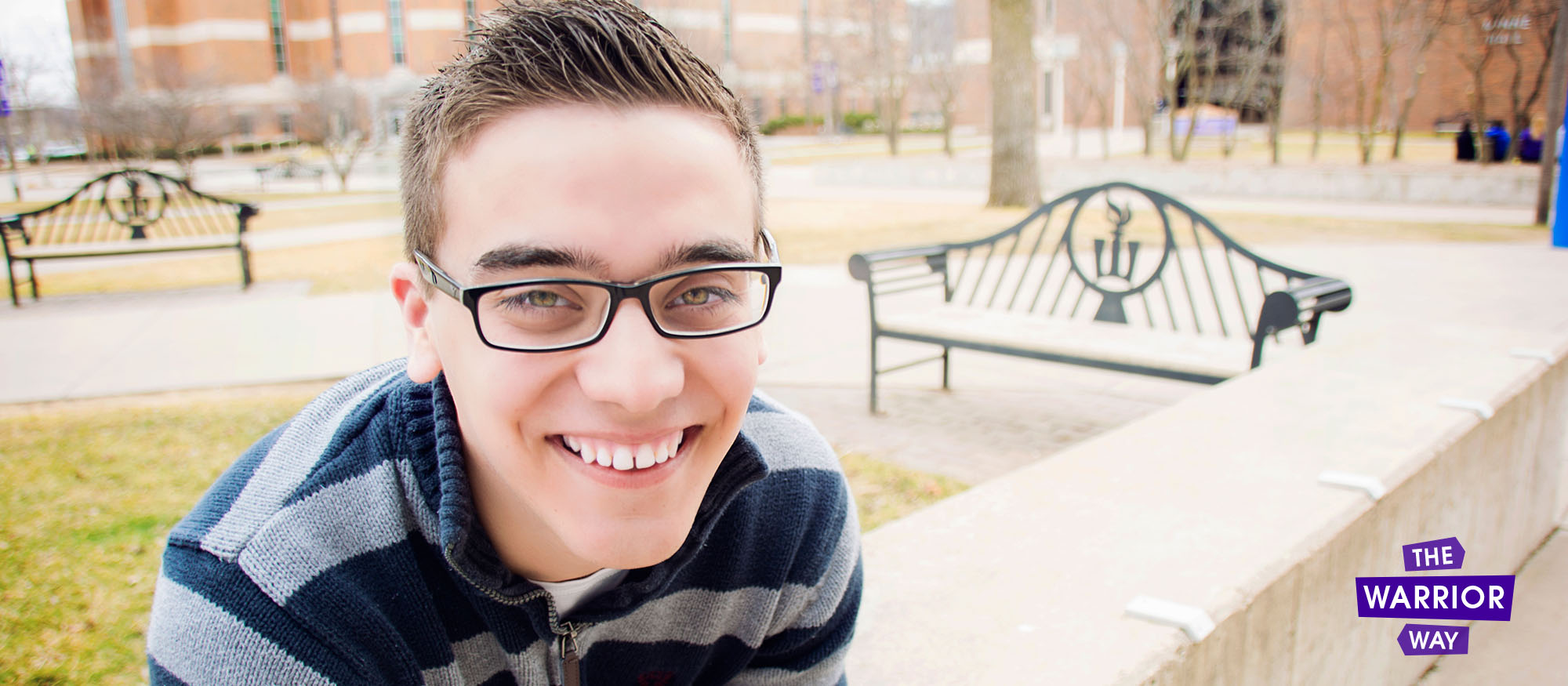
Sam Bach ’15 | Taking Civic Action
Student from Browndeer, WI
Political Science & Public Administration Majors
“I’ve seen a lot of problems go unchanged, and I want to be in a position both now and in the future where I can do something to fix those problems.”
Compassion, strength of character, humility, kindness, sincerity, authenticity, selflessness–all qualities you’d want in a leader, and upon meeting Sam and talking to him, it’s clear he has them. It’s no wonder he was elected to Student Senate three years in a row, and was named the political science honor society president of Pi Sigma Alpha and, last but not least, was chosen for an internship at the White House working under Michelle Obama herself.
Sam thought he’d have a career serving the community as a police officer rather than a politician. But I think the world can be glad he changed his major from criminal justice to political science and public administration. We need more people like Sam who believe government can improve society and who want to be in a position to make real changes in people’s lives.
How did you get involved in civic action and what are some of the experiences you’ve had?
It started when I met my advisor, Dr. Kara Lindaman, who got me involved in campus organizations like the American Democracy Project, an organization that focuses on getting students civically engaged and working with the community. For example, we worked with high school students in Winona to put together a forum on public education and were able to get people involved in a discussion rather than a shouting match. Additionally, my experiences in Student Senate got me thinking about going into public service so I applied to several internships in government.
In the summer of 2012, I interned at Senator Herb Kohl’s office in Milwaukee and did everything from delivering mail to assisting the staff to answering the phone. This gave me a good opportunity to work with constituents and people on all different issues like social security and veterans’ affairs. That same summer I also worked on President Obama’s re-election campaign in Milwaukee and organized a campaign team in my hometown. But the most exciting thing I’ve done is my internship at the White House with the First Lady in Summer 2013. I basically worked in her correspondence office as the liaison to her Let’s Move Office and Joining Forces Office as well as a sort of the agency liaison. It was a really good experience that opened my eyes because one of the criteria for the White House internship is a record of public service and civic engagement and when you are interning there you have to go out into D.C. and volunteer at a food bank, a nature preserve or somewhere else.
When did you get involved in WSU Student Senate?
It feels like forever ago, but it was about three years ago when I was elected senator for the College of Liberal Arts, a position which I currently hold. On Student Senate, I’ve served as the chair of Services Committee, and last semester I was the chair of the Public Relations Committee. Since Student Senate is responsible for funding many club activities, it’s cool to see what all the organizations are doing but I think the most rewarding part is taking issues that affect many students on campus to the University administration.
Recently we passed a motion about the Americans with Disabilities Act and brought that forward to President Olson because there are many areas on campus that are not compliant with the act. Now they are hiring someone to come to campus and suggest fixes for all the problem areas.
Why are you drawn to civic action and public service?
A lot of it is because my mom works for Gathering of Southeast Wisconsin, an organization that works to feed the homeless and hungry in Milwaukee—and when I was younger I volunteered there a lot. I would help prep and serve the meals and talk to guests, who were really nice. A lot of them were struggling with mental illness and they couldn’t control their situation; the system has failed them. In all my experiences I’ve seen a lot of problems go unchanged, and I want to be in a position both now and in the future where I can do something to fix those problems. I want to make sure that I’m working for the overall betterment of society in my career, and I think that politics—even with the partisanship–can contribute to good because usually that back and forth comes to a compromise.
What do you want to do after graduation?
I would like to go to law school and eventually work in the public sector. Thanks to listening to lectures by Dr. Bosworth, who focuses a lot on law and court cases, I am fascinated by the field so I think that becoming an attorney would be the best way for to give back and also for me to stay happy. It’s important to give back and help people but also to be happy with your life.
I’ve thought about going into civil rights law, environmental law and even about intellectual property/business law a bit but I always come back to civil rights. I think it’s because that is an area where you are always going to advocate for someone—not always on the same issue—but that there are always going to be people who need someone to fight for them in that area whether those cases produce visible results or just that someone feels safe when they are walking the streets or feels comfortable to be who they are. I also want to stay involved doing volunteer work like at the Gathering and the Food for Thought program. I have volunteered with Food for Thought before and helped pack lunches along with other members of Pi Sigma Alpha for kids who are on free/reduced lunch program at Jefferson Elementary so they’ll have something to eat over the weekend.
Who has influenced you the most?
Throughout my life, I would say my parents have been most influential because seeing them volunteer at different school events and at work at the Gathering made me want to do good things in the world. On campus, Dr. Lindaman is a really good advisor who made me feel like I found my place. After my first semester I wanted to leave, but it’s because of her and how she helped me get involved in Student Senate, the American Democracy Project and in the Political Science Department that I am still here and got all those internships. She goes above and beyond to make sure that you are doing what you want to do and help find ways to get involved so you are helping yourself for the future and helping others as a public servant.
If you could invite anyone to sit on this bench and have a conversation, who would it be and what would you talk about?
I think it would be interesting to talk to Elizabeth Warren about what made her want to fight for consumer protection and college student loans and why she continues to run for senate and dedicate her life to helping in those areas.
I also think it would be great to talk to Franklin Delano Roosevelt, because he was the president during the Great Depression and WWII who enacted the New Deal and all these pretty liberal policies. The FDR administration wasn’t really that long ago, but a lot has changed within our government and our politics. I’d ask him what he thinks of the Republican and Democratic parties today and our role in the world because it wasn’t until his presidency when the U.S. started to grow a massive military and become a world power.
Interviewed and Edited by Elizabeth Meinders ’15 and photographed by Anna Rae Butler ’15
To nominate someone in the WSU community — faculty, staff, student, alumni or friend of WSU — for Warrior Way, or if you have other feedback to share, please email Mollee Sheehan, director of web communications: msheehan@winona.edu
